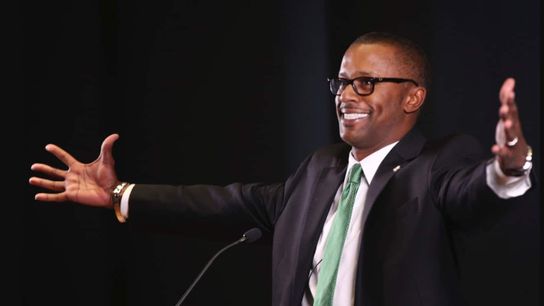Willie Taggart's tenure at Oregon started with a mistake.
In the team's first workout under the new regime, strength coach Irele Oderinde led the Ducks through a "grueling" and "military-style" workout that ended with three players hospitalized from severe overwork. Taggart suspended Oderinde for a month and apologized to the player's parents.
The story blew up nationally, Taggart suspended Oderinde for a month and, eventually, everyone moved on. Except the two principals involved: Taggart and the reporter who broke the story.
As Oregon's student paper The Daily Emeraldreports, Taggart is no longer speaking with Oregonian beat writer Andrew Greif. He reasoned that stance by giving some quotes to the Emerald that, quite frankly, are starting to hear from the mouth of a major college football coach on the record in 2017:
“When you’re not fair and honest, then to me that’s personal,” Taggart said. “When you do something that’s negative and it’s going to be personal, then I won’t have shit to do with you.”
“‘You’ve got to be shitting me,’ was kind of my reaction,” Taggart said. “I explained exactly what happened and he didn’t report it.”
When asked if he will continue to field questions from Greif, Taggart said, “No.”
Taggart said he recently ignored a text from Greif asking to talk things over.
Taggart said he wants The Oregonian to issue a retraction, which he says would be "fair and honest." Greif says the paper has nothing to retract. "We reported the story fairly and accurately without any agenda of any kind," he said.
At the heart of the issue is Greif's use of the phrases "grueling" and "military-style." Taggart and Greif spoke about the workouts in advance of the piece's Jan. 16 publication; Taggart said he told Greif the workouts were not "grueling" or "military basic training", while Greif says the coach never said that. Greif then went on Outside the Lines to discuss the piece.
“The story is out there, and then the next day you go on the ‘Outside the Lines’ and just not only stabbed me but turned the damn knife,” Taggart said. “He wanted his five or 10 minutes of fame and he got it.”
Except, there's the rub. There are two of them, in fact. The first is that, according to Greif's original piece, the phrase "military basic training" was used by Taggart's own people. From the original piece, emphasis added:
Players this week were required to finish the same workouts, which were described by multiple sources as akin to military basic training, with one said to include up to an hour of continuous push-ups and up-downs. An Oregon official disputed a claim that some players had "passed out," saying the training staff did not see any players faint; another UO official later said that athletic trainers were available to those who needed treatment during the workouts.
The next issue for Taggart is that Oregon commissioned its own faculty athletic representative to conduct his own investigation. Journalism professor Tim Gleason interviewed players, coaches, trainers, the athletics director and the head of the Ducks' training staff, and he reached a different conclusion than Taggart:
Gleason told the Emerald he did not think Greif’s report was unfair. Rather, he felt the “military-style” characterization was “unfortunate” because people latched onto that term and viewed the workout as “some kind of weeding-out, boot-camp-like effort.”
“It’s not an unfair characterization; it’s just that the way it gets interpreted is regrettable,” Gleason said. “In the shorthand of journalism, it resulted in an impression that may not have been completely accurate.”
Gleason made clear that mistakes were made by athletic department personnel. The workout, he said, was not in conformance with NCAA best practices for first practices after a long layoff. But the public’s perception of the story, he said, came off in a way that implied the intent to harm the players, which he said could not have been further from the truth.
Gleason said the issue originally rose out of poor planning a lack of communication by Oregon's strength staff. The workout stretched beyond NCAA guidelines for the first session back after a 6-week layoff, coupled with a "team-building" dynamic where players felt pressured not to tap out of the session, even to the point of hospitalization.
Even if the term "military basic training" was regrettably interpreted by readership, that phrase, according to Greif's report, arose, again, from Oregon's own staff.
Thus two questions:
1) If Taggart contested the difficulty and intent of Oderinde's workout, why did he allow Oderinde to be slapped with a 1-month, unpaid suspension in the first place? If the characterization of the workout has been completely overblown, why didn't Taggart pound the table to keep Oderinde in place, especially in this crucial first month of winter workouts? "The safety and welfare of all of our student-athletes is paramount in all that we do," Oregon said in its release announcing Oderinde's suspension.
2) How has no one at Oregon -- I'm talking about AD Rob Mullens specifically here -- talked Taggart out of this stance? Is there any way a multi-million dollar coach ignoring a reporter who makes a fraction of that -- the lead reporter at the paper of record in your program's home state -- can come across as anything other than bullying?
The Willie Taggart era at Oregon began with a mistake. Taggart's response to that mistake will likely be viewed by many as compounding that mistake with another one.
Scott updates with his thoughts:
Willie Taggart's choice not to speak w local reporter feels wrong, will be criticized by many. My advice to others https://t.co/Korg1Q0Vycpic.twitter.com/7pbSaIXmGa
— FootballScoop Staff (@FootballScoop) February 23, 2017
